 |
Picks is a monthly sampling of Japan's art scene, offering commentary by a variety of reviewers about exhibitions at museums and galleries in recent weeks, with an emphasis on contemporary art by young artists. |
 |
 |
 |
16 December 2019 |
 |
| 1 | 2 | |
 |
|
 |
 |
|
 |
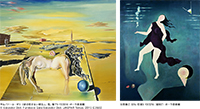 |
 |
 |
 |
| Surrealist Painting: Influences and Iterations in Japan |
| 15 December 2019 - 5 April 2020 |
Pola Museum of Art
(Kanagawa) |
 |
| This show represents a pioneering effort to determine how Surrealist painting evolved from the Surrealist movement and, further, how Surrealism was adopted and modified in Japan, where the term was translated into a word literally meaning "ultrarealism." In this country Surrealism came to connote less an exploration of the unconscious and more a style of painting that dealt in the unreal, the fantastic, the bizarre. It also gradually got blended with elements of Eastern thought, yielding a uniquely Japanese mode of expression that spawned the everyday term shuuru. |
|
|
|
|
|
|
|

|
 |
 |
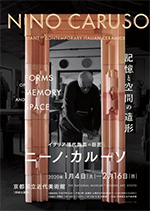 |
 |
 |
 |
| Forms of Memory and Space: Nino Caruso, Giant of Contemporary Italian Ceramics |
| 4 January - 16 February 2020 |
The National Museum of Modern Art, Kyoto
(Kyoto) |
 |
| Japan's first major retrospective on Caruso (1928-2017), the celebrated Italian ceramist, boasts some 90 of his works along with a large number of mockups, sketches, and other appurtenant materials. Known for the mythical and symbolic elements in his work, Caruso started out making decorative pieces inspired by memories of his birthplace, but went on to produce forms resembling the walls, columns and gates of Roman ruins, creating spaces that seem at once ancient and contemporary. |
|
|
 |
 |
 |
 |
| Japanese Symbols of Luck |
| 12 December 2019 - 19 January 2020 |
Hiroshige Museum of Art, Ena
(Gifu) |
 |
| When people in Japan talk about good or bad luck, they use the word engi, which is actually an abbreviation of the Buddhist concept innen seiki -- "dependent arising," the cosmic truth that everything has a cause. Engi came to refer to the historical origins of a shrine or temple, then more broadly to the causes of events in general -- and hence of luck, good or bad. This creative exhibition explores life in Edo-era (1603-1867) Japan as it examines the diverse symbols of luck that appear in ukiyo-e. |
|

|
 |
 |
 |
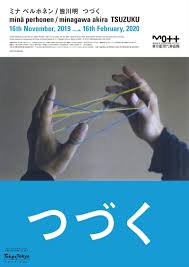 |
 |
 |
 |
| minä perhonen / minagawa akira TSUZUKU |
| 16 November 2019 - 16 February 2020 |
Museum of Contemporary Art Tokyo
(Tokyo) |
 |
| Minagawa (b. 1967) launched his career in fashion design with the goal of establishing a brand that would "continue for at least 100 years." His brand name, TSUZUKU, means exactly that -- "continue" in the temporal sense -- but is meant to connote more: the connecting and circulating of people and things in a linkage that unleashes creative energy. As Minagawa's flagship minä perhonen brand turns 25, this exhibition showcases not only products but also artwork, videos, and original drawings. |
|
|
 |
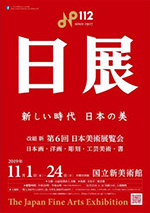 |
 |
| The Japan Fine Arts Exhibition (Nitten) |
| 1 - 24 November 2019 |
The National Art Center, Tokyo
(Tokyo) |
 |
| As in last year's installment of the "Reorganized New Nitten," the Nihonga (Japanese-style paintings) seemed fresher than those in the Western-style category. Wataru Kawashima's Tou ("Freeze") is a completely abstract work that would never be mistaken for "Western-style," while Setsuro Terashima's Sou ("Thought") resembles a promotional pamphlet with colorized photos of sights in Kyoto. Meanwhile, Taeko Chikamatsu, Natsumi Sako, and Emi Okumura contributed some decidedly Poppish, mangaesque Nihonga. |
|
|
|
|
|
|
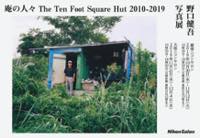 |
 |
Kengo Noguchi: The Ten Foot Square Hut 2010-2019 |
30 October - 12 November 2019 |
Nikon Salon Ginza
(Tokyo) |
 |
| Photographer Noguchi has been working on this series for nearly a decade. His subjects are people who live in handmade homes they have built along rivers and in parks. The term he uses to describe these dwellings, iori, meaning hermitage, seems spot-on. Though the structures are intended to be temporary, amenities added by their residents over time often turn them into surprisingly comfortable living spaces. |
|
 |
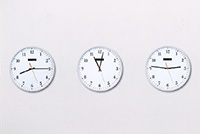 |
 |
| Alfredo Jaar: The Sound of Wind |
| 4 October - 2 November 2019 |
Kenji Taki Gallery / Tokyo
(Tokyo) |
 |
| Chile-born artist Jaar mounted three identical clocks on the wall, set respectively to 8:15, 11:02, and 2:46: the times of the atomic bomb detonations in Hiroshima and Nagasaki, and the earthquake in Fukushima. While admiring the concept behind the work, this reviewer felt compelled to ask whether it made sense to line the three events up that way. Two were man-made holocausts perpetrated as acts of war, killing hundreds of thousands, while the third was a nuclear accident. Do they really carry equal weight? It's a social and philosophical question, one not as easy to answer as this installation would imply. |
|
|
|
|
 |

 |
|
|
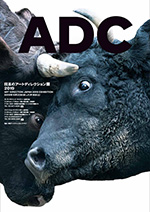 |
 |
| Art Direction Japan 2019 Exhibition |
| 23 October - 16 November 2019 |
Ginza Graphic Gallery
(Tokyo) |
 |
| The Tokyo Art Directors Club holds this show annually to display prizewinning submissions to its ADC Awards competition. This year's Grand Prix went to Tsuguya Inoue for his design of posters and other graphics for the 30th anniversary re-release of an iconic album of fashion runway music, Comme des Garçons - Seigen Ono. Inoue's front and side views of a solemn-looking black bird give full rein to the latent power of photography. |
|
|
 |
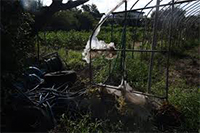 |
 |
| Yuki Shimizu: Empty Park |
| 26 October - 6 December 2019 |
PGI
(Tokyo) |
 |
| Known for works that weave photographs and stories together, Shimizu here introduced a new piece, a "tale of invisible water and old land." Next to a park she played in as a child was a "mysterious grassy expanse" laced with small rivulets of water, which she was told sometimes flooded to form a large pond. In this show she interspersed photos she took of the park on a visit 20 years later with prose in which such characters as a "would-be water thief" and a "cleaner of the park" appear. |
|
|

|
 |
|
 |
| 1 | 2 | |
 |
|
 |
|